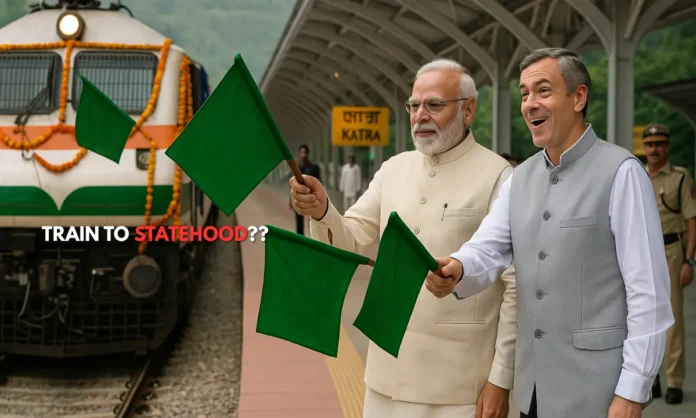Summary
- Jammu and Kashmir Chief Minister Omar Abdullah used the inauguration of a landmark rail link to press Prime Minister Modi for restoring full statehood.
- The speech marked a symbolic juxtaposition between infrastructure milestones and constitutional status changes post-2019.
- Abdullah’s public appeal revives national focus on the demand for reversing J&K’s Union Territory designation, echoing broader democratic aspirations in the region.
Tracks to the Future, Shadows of the Past: The Statehood Demand in Focus
On June 6, 2025, at the scenic Katra station where the first train to Kashmir was ceremoniously flagged off, a historic infrastructure achievement collided with a lingering political wound. Jammu and Kashmir Chief Minister Omar Abdullah, standing beside Prime Minister Narendra Modi, made a public and pointed case for the restoration of J&K’s statehood—blending subtle humour with constitutional urgency.
The platform itself carried historical weight. In 2014, then CM Abdullah presided over the opening of Katra station under UPA rule. A decade later, he stood in the same place, not as the CM of a state, but of a Union Territory—an administrative downgrade that resulted from the abrogation of Article 370 in August 2019. “I stand slightly demoted,” Abdullah quipped, referencing the unchanged political ascension of Modi and others who shared the dais then and now.
But beneath the light tone was a serious appeal. Abdullah’s speech did not merely reflect personal grievance; it captured the collective sentiment of many Kashmiris who view the 2019 reorganisation as a unilateral step that diluted their political autonomy. His assertion that “it will not take long for this to be corrected” was both a forecast and a plea—a calculated prod to reopen a closed conversation.
#Watch: Omar Abdullah's emotional appeal to PM Modi on Statehood says "LG Manoj Sinha promoted whereas I'm demoted…"#jammukashmir #OmarAbdullah #ManojSinha #BJP #Modi #Kashmir@OmarAbdullah @JKNC_ pic.twitter.com/4una2xfACg
— News Insider 24×7 (@newsinsider24x7) June 6, 2025
Railways and Realignments: What Abdullah’s Speech Signals Politically
- Abdullah’s speech received a public round of applause—unusual in such high-level, stage-managed events.
- The Chief Minister drew direct contrasts between central progress on infrastructure and lack of constitutional restoration.
- His reference to inflated airfares and fruit logistics signalled the everyday costs of incomplete connectivity.
- He acknowledged BJP leaders like Vajpayee, showing bipartisan appreciation to bridge ideological gaps.
- This moment marks the first time since 2019 that a CM has directly appealed to Modi, in person, for statehood.
The location, timing, and phrasing of Abdullah’s remarks were carefully chosen. Speaking on the completion of the Udhampur-Srinagar-Baramulla rail link—a project three decades in the making—Abdullah cast the achievement as a collective win, while implying that political dignity remains incomplete. His narrative strategy? Leverage a success Modi could celebrate to place a demand that Modi has strategically evaded.
Crucially, Abdullah was not confrontational. Instead, he framed his appeal in terms of gratitude and continuity. He even credited former PM Atal Bihari Vajpayee for declaring the rail link a national project. In doing so, he positioned himself—and Kashmiris—as partners in the nation’s development, not dissenters. This soft power approach may signal a shift in how regional leaders articulate their demands: not as adversaries but as co-architects of national unity.
However, the speech also underlined growing public impatience. From price-gouging airlines during highway closures to logistical delays for fruit exports, Abdullah illustrated how being a Union Territory can translate into practical hardships. These are not just symbolic demotions; they are economic and civic ones too.
Statehood as a Democratic Reset: The Broader Debate Resurfaces
- The 2019 reorganisation remains legally and emotionally contested in Kashmir’s political discourse.
- Supreme Court upheld the reorganisation in 2023, but left the door open for political dialogue on statehood.
- Restoration of statehood has been promised by the BJP “at an appropriate time,” but no roadmap exists.
- Regional parties, including National Conference and PDP, have made statehood central to their 2026 election agendas.
- Public infrastructure achievements are now being used to reframe the constitutional status debate.
While the Narendra Modi government continues to foreground developmental optics in J&K—new roads, airports, expressways—leaders like Abdullah are reminding the nation that governance is not just about bridges and trains, but about representation and identity. The speech was also a challenge to the BJP’s long-standing narrative: that development can substitute for autonomy.
The return of this demand also has national implications. As India moves toward the 2026 elections, J&K’s statehood could re-emerge as a pivotal campaign issue, especially if regional sentiment grows louder. BJP has committed to statehood “at an appropriate time,” but the absence of a deadline feeds both scepticism and mobilisation.
Interestingly, Abdullah’s tone was devoid of the defiance that once marked Kashmir’s mainstream political discourse. Instead, it bore the weight of someone seeking partnership, not confrontation. Yet that makes the appeal harder to ignore. He invoked history, policy, and even shared legacy to press a case that may resonate across political aisles—especially among those who view prolonged central control as incompatible with federal ideals.
A Platform and a Promise: Where the Tracks Must Lead
What Omar Abdullah delivered on that platform in Katra was more than a ceremonial speech—it was a diagnostic snapshot of the democratic deficit that still haunts Jammu and Kashmir. The completion of the rail line was a metaphor for progress—but also a reminder of what remains stalled.
In the coming months, the conversation around Jammu Kashmir statehood restoration 2025 is likely to intensify. Whether the Centre responds with a roadmap or continues its silence will shape not only the region’s political future but also the credibility of India’s federal promises. As trains begin to run through the valley, the people now await the return of something else: a full state’s voice in the nation’s constitutional journey.


